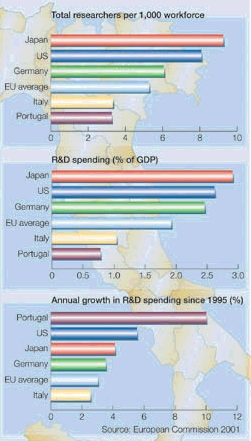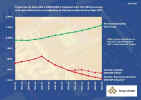It was almost three
months ago, but it's a good touchstone for the viewpoint of Australia's
Government when regarding recent world events.
It's a program within the context of Backing Australia's Ability to improve the national innovation system. It was designed to equip graduates across a broad range of disciplines with problem solving skills.
...It is not as if we need more science graduates particularly, but probably fewer, better funded and better quality.
That last was a reference to the fall in science enrolments across the board. Gallagher's view is that student demand for maths and science degrees were declining because the labour market was saturated with scientists. The mindset of the Government is extraordinary. The facilities of our tertiary establishments continue to be decimated with minor alleviation being budgeted for, even in the longer term let alone within the next couple of years. And these institutions are supposed to turn out graduates of "better quality." WITH WHAT?
Furthermore, when the nation's gross expenditure on research and development as a percentage of GDP (GERD/GDP) has fallen from 1.6% to 1.4% in the past five years it really doesn't take a Nobel Laureate in economics to work out why there is a decline in demand. Current OECD and EU average? Both 2.0%, and the EU aren't particularly self-satisfied. On July 13th the journal Science reported on the shutting down of the Basel Institute of Immunology:
The [Institute's] shutdown, some observes say, coincides with a decline in support for basic research in Europe. People feel that European leaders are emphasizing science as a means of stimulating the economy "as opposed to discovering novel principles in biology," says Harald von Boehmer, a permanent member who left in 1996 and now heads a group at the Dana-Farber Cancer Institute in Boston. That's one reason, he says , why several leading immunologists have moved to the United States, "where funding for basic research... is by comparison enormous."
Meanwhile in Japan 14 heads of major laboratories joined by four
former heads have overcome their
 customary
public reticence by sending an open letter to Prime Minister Koizumi, imploring
that his government show a greater recognition of the value of basic research.
The research chiefs plead for a bigger role for active researchers in shaping
the nation's research policies. This resolute position was as a result of a
report released on July 12th by Japan's top science advisory body,
and chaired by the Prime Minister, advising that the government realign its
research priorities "to strengthen industrial competitiveness, invigorate the
economy, [and] promote a high quality of life and a vigorous society."
customary
public reticence by sending an open letter to Prime Minister Koizumi, imploring
that his government show a greater recognition of the value of basic research.
The research chiefs plead for a bigger role for active researchers in shaping
the nation's research policies. This resolute position was as a result of a
report released on July 12th by Japan's top science advisory body,
and chaired by the Prime Minister, advising that the government realign its
research priorities "to strengthen industrial competitiveness, invigorate the
economy, [and] promote a high quality of life and a vigorous society."
The report then gets specific recommending that the up coming budget (April
2002) should encourage efforts in the life sciences, information technology,
environmental studies and nanotechnology.
What so disquieted the group of 18 research leaders was what to them is an over emphasis of "the short-term goal of strengthening industrial competitiveness." Such a shortsighted imbalance would overlook the fact that "advanced science and technology must be supported by the cultivation of basic research in a wide range of fields." The fact that the report of the Prime Minister's advisory committee virtually disregards basic research prompted what by Japanese standards was the outburst, and while the new minister for science, career politician Koji Omi, has issued assurances, "We recognise the importance of basic research... those laboratory heads don't have to worry," the lab chiefs are by no means fully mollified and are considering how to become more influential in determining future science and technology policy debates. It all has something of a familiar ring especially since our Prime Minister chairs, at least nominally, the twice yearly Prime Minister's Science, Engineering and Innovation Council. Note for example the list of papers presented at the latest (June 28th) meeting given on the PMSEIC Web site.
Edited versions of some of the papers presented to the meeting are available below. They were prepared by independent working groups for PMSEIC and the views expressed in them are those of members of the groups, not necessarily those of the Commonwealth government.
Australia's mineral exploration.
Commercialisation of public sector research.
Developmental health and well-being: Australia's future.
Finally, it's worthwhile taking a close look at the graphic
published by the EC (above). Note for example that Australia
that Australia
Alex Reisner
The Funneled Web